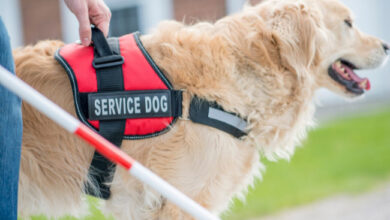
Many people are benefiting from emotional support animals (ESAs). These animals help them to cope with mental health challenges like trauma, stress, or anxiety. However, like any medication, there is no universal solution for all who need emotional support animals.
These best companion animals come in different types, sizes, and breeds. The effectiveness of your ESA can be influenced by various factors, including compatibility, training, and individual needs. Therefore, this article discusses everything about emotional support animals and how to select the best one for you.
Understanding Emotional Support Animals
Emotional support animals provide comfort, companionship, and other therapeutic benefits to people with emotional or mental health challenges. These challenges include depression, trauma, anxiety, stress, ADHD, or PTSD.
An ESA differs from a service animal. A service animal is trained to perform a specific task or function for an owner with a physical or sensory disability. On the other hand, support animals offer therapeutic benefits simply by their presence, and do not need to perform specific tasks to calm and comfort owners. Unlike service animals, they also do not require licensing or certification.
Similarly, emotional support animals are different from therapy animals. ESAs serve only their owners, while therapy animals are used to comfort and calm people other than their owners. Therapy animals may be handled by their owners or a professional handler when used.
Types of Emotional Support Animals
ADA regulations only allow dogs and miniature horses to serve as service animals. However, this rule does not apply to emotional support animals. You can keep any animal or pet for emotional support.
Provided you can manage the animal in public and always keep it under control, you can keep it as your support animal. While dogs and cats are the most common support animals, many others are also used. Below are six common animals used for emotional support. Read through to find an option that appeals to you.
1. Dogs
Dogs are the most popular support animal, and provide stability to their owners. Their physical touch, loyal companionship, and loving demeanor make them good support animals. Dogs are a popular option for emotional support because they are easy to get. Many companies provide trained dogs of different breeds.
2. Cats
Cats are another popular option for emotional support animals. Studies show that their company reduces stress levels and promotes emotional health. Felines have soft, smooth furs and a clingy nature that calms owners during interactions. They are also small and independent, with lower maintenance than dogs.
3. Rabbits
Rabbits are cute, gentle, and playful. These qualities make them good support animals for anxiety and stress patients. Rabbits’ playful behavior offers therapeutic benefits. Their soft furs make them excellent cuddle buddies good for relaxing the nerves.
4. Guinea Pigs
If you can’t handle the commitment of larger mammal pets, get domesticated rodents. They offer the same emotional support in smaller packages. Guinea pigs are good options, as they are attentive and intelligent, friendly and playful, making them good companions for emotional support.
5. Birds
Domesticated birds like parrots and parakeets make good emotional support animals. Birds are intelligent and empathetic, with unique personalities. They care for you emotionally, as you do the same for them physically. Parrots have vocal skills that foster socialization, while other singing birds soothe you with their exciting voice.
6. Miniature Horses
If you have the space and means for it, a miniature horse is an excellent animal for emotional support. They are calm and affectionate, always interested in their handler. Petting, brushing, and cleaning them is relaxing and therapeutic.
3 Factors to Consider When Choosing an Emotional Support Animal
The effectiveness of an emotional support animal usually depends on its compatibility with its owner. Choosing the right support animal for your needs is important. Here are three factors to consider when seeking a compatible support animal:
1. Your Specific Emotional Needs
Understanding the exact needs your support animal should fill will help you choose the right animal. Certain animals and breeds have specific qualities and characters that make a good or bad fit your needs. For example, anxious people may benefit from a calm and affectionate animal, while gentle and predictive animals may be suitable for autistic individuals.
2. The Animal’s Behaviors and Temperament
You’ll best achieve compatibility when you factor in an animal’s temperament and behavior. Get an animal whose temperament you love and whose behavior you can tolerate. If you’re active, choose an affectionate animal and breed with high energy levels. Conversely, if you’re anxious or stressed, get an animal with a calm demeanor that enjoys physical contact.
3. Health Concerns
Consider allergies and other health issues. If you’re allergic to a specific animal, it is best to avoid it. However, you could try to minimize pet dander to counter your allergy. It also helps to check for other health issues. Ensure you have no condition that an animal’s presence can exacerbate. If you have persisting health issues, choosing low-dander support animals like rodents is safest.
3 Qualities of a Good Emotional Support Animal
Besides the general characteristics of an animal or breed, an animal’s individual qualities also contribute to its success in offering emotional support. Below are some excellent qualities of a good emotional support animal:
1. Obedient and Trainable
While your ESA is not a service animal, it must be able to obey simple orders and learn. Disobedient and unruly animals are usually difficult to control and destructive. Unless you can train your animal, it’ll add to your mental stress rather than provide comfort.
3. Affectionate
The primary responsibility of support animals is to provide comfort to their owners. Thus, your ESA should discern when to draw closer and provide comfort. They should develop reactions that soothe you when they sense discomfort.
3. Sociable
It’s insufficient for your support animal to be friendly with you; it must also be friendly to others. This quality enables you to move about and even travel with it, even without an ESA letter. Additionally, it prevents anxiety and stress from trying to restrain them during hostile encounters.
Endnote
Emotional support animals provide comfort and therapeutic benefits to people with mental health challenges. You can choose any controllable animal as your support animal, provided they are affectionate, friendly, and trainable. Consider your emotional needs, the animal’s behavior, and health concerns when selecting an ESA for the best choice.



